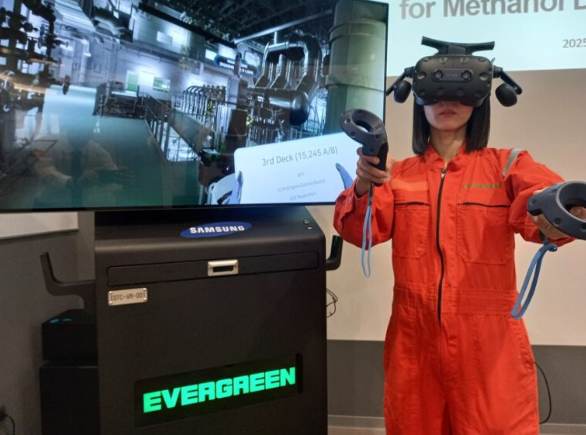
| Subject | Samsung Heavy, Evergreen team up on VR dual fuel vessel seafarer training | ||
|---|---|---|---|
| Reg. date | 2025-07-14 | Views | 21 |

[Offshore Energy/July 11, 2025] South Korean shipbuilder Samsung Heavy Industries (SHI) has collaborated with Taiwanese container shipping company Evergreen to develop and install virtual reality (VR) solutions intended to teach seafarers how to operate green ships.
As informed, VR solutions have been installed at Evergreen Seafarer Training Center (ESTC). They would assist seafarers in learning how to operate eco-friendly equipment used on 16,500 TEU containerships owned by the Taiwanese shipping player.
The launching ceremony for the methanol dual fuel vessel seafarer training VR took place at ESTC on July 11, 2025.
According to the shipbuilder, its VR solutions are designed to train seafarers who operate methanol dual-fuel propulsion vessels within a virtual space to help them learn fully about the equipment prior to operating the vessel in real life.
As Offshore Energy reported back in 2023, Evergeeen ordered twenty-four methanol dual-fuel 16,000 TEU containerships in a monumental step toward decarbonizing its fleet. The newbuilding fleet is expected for delivery between 2026 and 2027.
It has become imperative for shipping companies to implement training programs for seafarers to operate new equipment due to stringent environmental regulations and a surge in eco-friendly shipbuilding orders. Against this backdrop, Samsung Heavy Industries has developed a program that facilitates direct inspections of critical areas, such as engine rooms and bunkering stations, in virtual spaces and provided it to the ship owner. This is achieved through VR solutions implemented using 3D design data, eliminating the need to board ships physically.
With VR solutions, seafarers can efficiently operate equipment with more complex systems than those found on conventional diesel engine ships. Additionally, these solutions offer repetitive training for emergency situations, such as fuel leaks or fire onboard ships. They are also anticipated to mitigate operational risks and reduce maintenance costs associated with malfunctions or misuse of critical equipment.
 HOME
HOME








